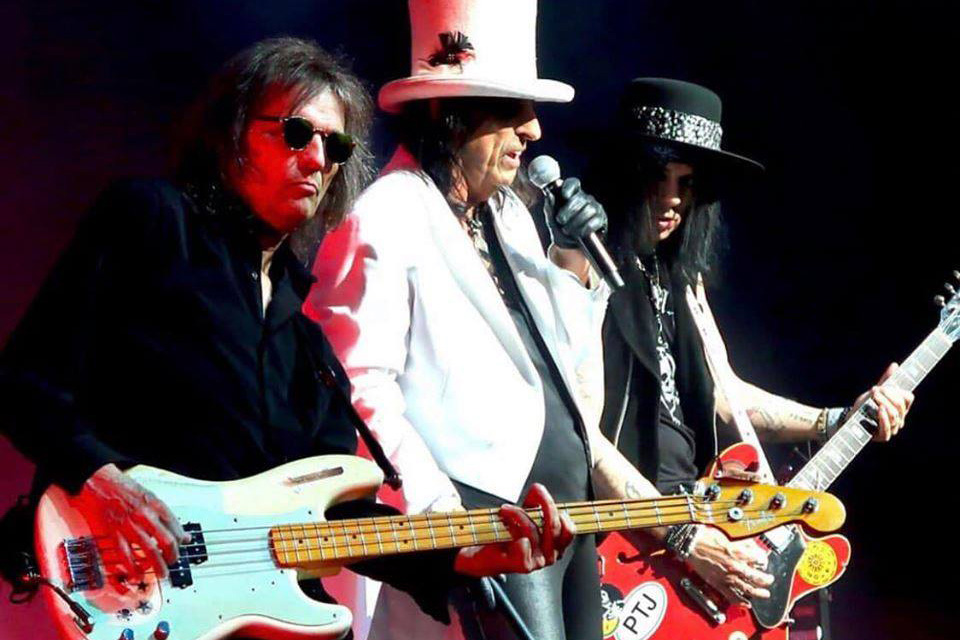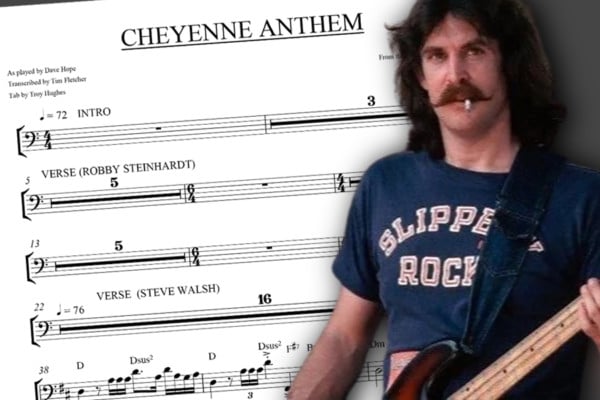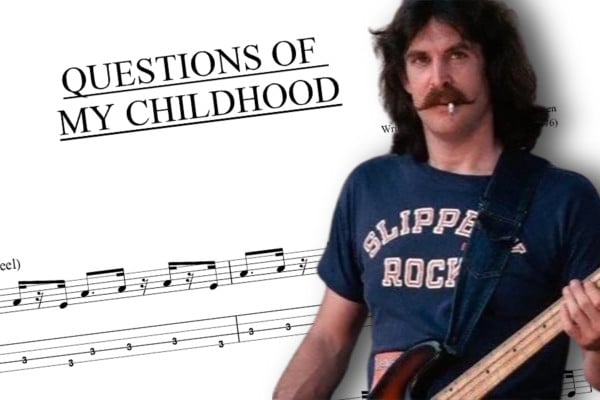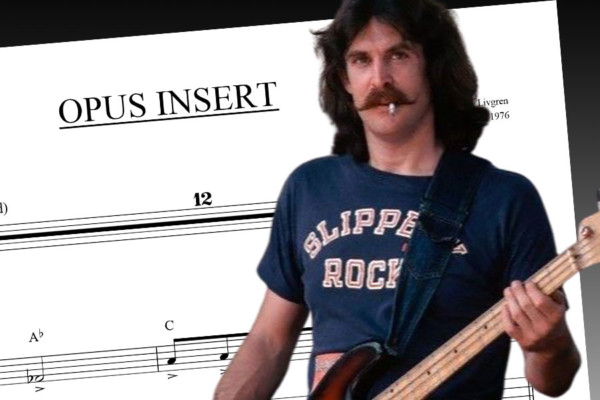Bass Transcription: Dennis Dunaway’s Bass Line on “No More Mr Nice Guy” by Alice Cooper

Alice Cooper was a very influential band – they helped to develop a more theatrical approach to the presentation of rock music. Their inclusion of scenery, props and special effects on their gigs were to become a common part of larger stadium-rock bands’ shows, and their use of horror imagery was an influence on the heavy metal genre.
Alice Cooper’s bassist, Dennis Dunaway was born in Cottage Grove, Oregon on December 9, 1946. His early musical experiences included seeing his family members play guitars and fiddles for “Honky Tonk” dancing sessions at his grandmother’s house, where they mostly played old-time folk and country music. When Dennis was four, his family moved to Phoenix, Arizona. At grade school, he played the violin, but with little success – he was so bad that the teacher made him play in the corridor. As a teenager, he listened to folk artists such as The Kingston Trio and Bob Dylan, and later The Beatles and other British Invasion acts like The Kinks and The Rolling Stones. He was also influenced by movie soundtracks (as was future bandmate Vincent Furnier) such as “West Side Story,” “James Bond,” and “The Pink Panther.”
Dunaway’s first “musical” performance was at Cortez High School in Phoenix, Arizona, in May 1964. He had seen Duane Eddie and The Rebels in a Phoenix theatre, and inspired by the excitement the band created, he persuaded his close friends Vincent Furnier and John Speer to form a band to take part in the annual Letterman’s talent show. Their act would be a parody of The Beatles, named “The Earwigs,” but none of them could play an instrument. They discovered that another Letterman, Phil Wheeler, played drums, and Glen Buxton, a member of their photography class, played lead guitar. Buxton suggested that they also approach John Tatum, a rhythm guitarist, and he quickly agreed to join.
For the show, Dunaway pretended to strum the guitar and Furnier mimed playing a ukulele. The group were a resounding success and won first prize in the talent show. This inspired them to perform at school lunch-breaks whenever they could, and this further fired up their ambitions to become a real group. With Furnier the obvious frontman, and Buxton and Tatum already playing guitars, Dunaway found himself the default bass player.
In order to generate funds to buy his first bass, Dennis worked on his grandfather’s farm in Oregon that summer. When he returned to Phoenix, he bought a short-scale Airline bass and was taught the fundamentals of playing the instrument by Buxton. Dunaway recalls that; “Glen…sat down with me and started teaching me the names of the notes and where they fell on the neck. I fell in love with it, playing along with Rolling Stones records.”
Soon the band was competent enough to play their first professional gig at the nearby Dunes Lounge, and in October 1964 they were hired to play for the horror-themed dance at their high school. The band was happy to go along with this idea – Dunaway remembers that “We got boxes to make tombstones, and [one of our] dads made our first guillotine”. This was perhaps the start of the theatricality that the later versions of the band were known for. Soon they were playing regularly in local clubs, and the band even wangled an appearance on “The Wallace and Ladmo Show” for their local TV station. Later in the year, they became the house band at The VIP Club, a teen hangout in Phoenix, playing covers of British bands like The Who and The Kinks. The owner told them that they should change their name and suggested “The Spiders.” The owner also allowed them to build a stage with a huge spider backdrop and they used some of the props they had made for the high school dance.
By March 1966 they had begun to play regular shows outside Phoenix and were doing occasional gigs in Los Angeles. They also recorded their first single – a cover of The Blackwells’ “Why Don’t You Love Me?” on the Phoenix label Mascot. They later released an original song “Don’t Blow Your Mind” on Santa Cruz records which sold well in the Phoenix area. When the band discovered there was a Japanese group called The Spyders, the band changed their name again, to “The Nazz,” taken from the lyrics of a Yardbirds song. The band was now covering songs by more progressive/psychedelic artists, and the new name was more in line with the material.
The band was soon playing more often in Los Angeles and they decided that in order to fully access that city’s growing rock music scene, they should move there. Initial gigs at The Hullabaloo, The Whiskey a Go-Go and Gazzari’s on Sunset Strip, and a residency at The Cheetah in Venice Beach helped to give the band some exposure, and they began to play shows supporting bigger acts such as Buffalo Springfield, Procol Harum, and The Doors. They released another single, “Wonder Who’s Loving Her Now,” but in order to avoid confusion with Todd Rundgren’s band (also called The Nazz), they again changed their name. Although the band suggested that the name “Alice Cooper” had come from a spirit they had contacted during an Ouija board session, Furnier later confirmed that he had simply chosen the name as a gimmick, because it sounded innocent and wholesome – the opposite of their music and presentation.
By now, the band was writing original songs to go with their aggressive and confrontational stage show. As Dunaway recalls; “Our show incorporated theatrical props and we kept pushing boundaries, becoming unpredictable to the point of threatening…our shows were bold and increasingly abstract, and so was our music”. This approach was not particularly successful in California, which was the epicenter of the hippy movement at the time.
As they became better known among the LA music community, they became friends with The GTOs (Girls Together Outrageously), an all-female band signed to Frank Zappa’s Straight label, who suggested that Zappa might be interested in hearing them. Rather than wait for him to come to a gig, they decided to go unannounced to Zappa’s house to play for him. Their ruse paid off, as Zappa was impressed enough to sign the band, but he insisted that they find a manager. The band invited Shep Gordon and Joe Greenberg to their next show at the Cheetah club where they were supporting The Doors for a Lenny Bruce Memorial concert. They quickly alienated the audience and after ten minutes they had all left. Surprisingly, Gordon and Greenberg were not put off by this and agreed to manage the band.
Their first two albums for Straight, Pretties for You (1969) and Easy Action (1970) were influenced by the early Pink Floyd albums (who they had befriended in L.A.) and were not commercially successful. This was perhaps due to the small label’s lack of promotional funding. Frustrated by this, and tired of playing to less than appreciative audiences in California, the band moved to a farmhouse near Detroit, Furnier’s home city. They soon went into the studio with new producer Bob Ezrin, who convinced the band to lose their vaguely psychedelic sound and simplify their material in order to appeal to a more basic rock audience. Ezrin took their song “I’m Eighteen” and cut it back from eight minutes to a more radio-friendly length, and he encouraged Furnier to give a raw edge to his vocals. The song was a surprise hit and the income from this was plowed back into the production for the band’s third album, Love it to Death which was issued in 1971. It was initially on Straight, but Warner Brothers bought out Zappa’s interest in the band and promoted the album more effectively than Zappa’s label was able to.
‘Love it to Death’ and the follow-up ’Killer’ (also 1971) both sold well, and the band began to tour overseas. The band’s horror-themed stage show, which included scenes of execution, was not welcomed by all. In the UK, Member of Parliament Leo Abse called for the tour to be banned, commenting that “[Cooper’s] incitement to infanticide and his commercial exploitation of masochism is evidently an attempt to teach our children to find their destiny in hate, not in love” and Mary Whitehouse, the campaigner for “cleaner” TV suggested that the band’s appearance on Top of the Pops was “distressing.” This only served to enhance the popularity of the band in the UK, and Shep Gordon sent Abse and Whitehouse gifts as a reward.
The next album School’s Out (1972) was even more successful than its predecessors, reaching number two in the US album charts. The title track got to number 1 in the UK (where the band had built a strong fan base) and number 7 in the US and remains a classic rock radio staple. Billion Dollar Babies (1973) saw the band’s popularity peak, reaching number 1 in both the USA and the UK, and four hit singles were taken from the album. The supporting tour was also a great success, breaking The Rolling Stones’ box-office record, with the band playing 64 concerts in 90 days.
The following LP Muscle of Love (1973) was perhaps begun too soon after finishing their tour to support the previous album – the band was exhausted, and tensions between band members and Bob Ezrin led to him being replaced as producer. Dunaway recalls that “The problems on that album were that we could tell that everything was being pulled out from underneath us. As hard as we tried to get it back to where it once was, we had that sinking feeling going on. We wanted to rekindle what the band was about but there was just too much exhaustion by then”. The band toured again in 1974, including a show in Sao Paulo, Brazil where the audience of 158,000 established The Guinness World Record for an indoor audience.
Sadly, this was to be the band’s last show as the broke up soon afterward – Furnier was becoming disconnected from his bandmates, and resentments began to surface relating to royalties and song credits. The band members contemplated solo projects and a year-long hiatus was mooted. Furnier’s project was “Welcome to My Nightmare,” an album linked to a TV special, and none of the band members were invited to take part. The audience’s inability to distinguish the Alice Cooper character from the band was exploited, and Furnier continued his career with new musicians, officially changing his name to Alice Cooper – this was already what many people believed anyway.
Warner Brothers released a Greatest Hits album in 1974, but this was to be the final release of the band. With Cooper gone, the other members continued as Billion Dollar Babies, and recorded an album Battle Axe (1977), but it was not a commercial success.
Although the original group has never reformed, they played together on three songs for Cooper’s Welcome 2 My Nightmare album (2011) and Dunaway and Michael Bruce also contributed to Alice’s Paranormal (2017). The members of the band were inducted into the Rock n Roll Hall of Fame in 2011, and in 2017 Dunaway joined Alice Cooper for five shows in the UK.
Aside from Alice Cooper, Dunaway has also played on albums for Deadringer; Electrocution of the Heart (1989), Ant-Bee; Lunar Muzik (1997), Bouchard, Dunaway and Smith; Dennis Dunaway (2001) and BDS Live in Paris (2003), The Dennis Dunaway Project; Bones from the Yard (2007), and 5th Avenue Vampires; Drawing Blood (2010).
Dunaway was initially a fan of blues music but developed an interest in “British Invasion” artists including The Animals, The Kinks, The Zombies and The Who. His early bass influences included Paul McCartney, Bill Wyman and especially Paul Samwell-Smith of The Yardbirds whose playing was a revelation; “I was enlightened…I knew that bass could do anything that I wanted it to do”. Dunaway didn’t copy the bass lines of his idols, but wanted to make his own style “I basically didn’t want to be like anyone else. I wanted it to be interesting.”
Dunaway has written a book about his time with Alice Cooper; Snakes! Guillotines! Electric Chairs! My Adventures in The Alice Cooper Group which was published in 2015. He currently records and tours with Blue Coupe (alongside Albert and Joe Bouchard formerly of Blue Oyster Cult) who are about to release their 3rd album.
On the first three Alice Cooper albums, Dunaway played a Gibson EB-0 (painted green and nicknamed “The Frog”). From the Killer album onwards, Dunaway played a customised Fender Jazz. He has also played a Hofner Beatle bass.
No More Mr Nice Guy
This song was written by Cooper and Michael Bruce and Cooper have stated that the lyrics are a response to criticisms from members of his mother’s church group about his stage persona and performances.
After a Stones-like guitar intro, the bass enters at bar six with a slide up, then a slide up and down in the following bar which leads into a fuller six-bar riff over Bm and E. Dunaway uses mainly quavers here, but adds a few semi-quaver skips to help the groove.
Verse one begins with simple semibreves on root notes, but Dunaway also includes a second inversion (C#m/G#) to add color to the line which ends on a unison syncopated idea. The pre-chorus is busier than the verses, with more movement around the chord, and Dunaway uses some sevenths and fifths as well as scale tones to link chords together. The chorus bass line is more root-oriented, but again uses chord tones and scale notes to link the chords.
In the bridge section, Dunaway moves to much higher positions for an eight-bar melodic idea, using hammer-ons to add legato smoothness. This section is also notable for the use of off-beat syncopation which allows for the open A string root notes.
This is followed by a return of the pre-chorus and chorus, and then a verse with no bass. A full verse follows this, and then repeated choruses to the end of the song which is finally concluded by repeats of the syncopated unison riff.
Download the transcription and follow along with the track.



“Video unavailable
This video contains content from WMG, who has blocked it in your country on copyright grounds.”
Hi Alan – which country are you in?